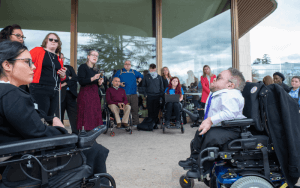A secret Department for Work and Pensions (DWP) review into the death of a claimant of universal credit (UC) has criticised the “overtly threatening” nature of the conditions they had to accept when signing up to the new benefit system.
The conclusion by a panel of civil servants relates to just one of 33 deaths, all linked to DWP activity, that have been subject to what are called “internal process reviews” (IPRs) since April 2016.
Brief details of these 33 deaths, and another 17 IPRs carried out into other serious or complex cases involving DWP activity, have been released to Disability News Service by DWP following a freedom of information request.
The panel of reviewers who carried out the IPR into the death linked to universal credit said that it seemed “excessive” for DWP to include eight references to sanctions and how much money a claimant would lose if they breached their “claimant commitment”.
The panel added: “…a better balance could be struck in reminding a client of the consequences of not meeting their obligations and not appearing to be overtly threatening, especially to individuals who are vulnerable.”
DWP has so far refused to say if it altered the claimant commitment – which sets out what conditions a universal credit claimant needs to meet to continue receiving the benefit – as a result of the IPR.
Further details of the circumstances of the death have not been released, as DWP is only obliged to release the recommendations made following each IPR (formerly known as peer reviews), rather than anything that could identify the subject of the review.
Of the 50 IPRs carried out since April 2016, six involved a universal credit claimant, and in four of these cases the claimant had died.
It is also not yet clear whether DWP acted on any of the other recommendations in the IPRs, but the case is likely to raise fresh concerns about the impact of the introduction of universal claimant on disabled people, and others in vulnerable situations.
It will also alarm those who have spent years highlighting concerns about the ongoing impact on disabled people of eight years of benefit cuts and reforms under successive Conservative-led governments.
DWP rules state that the department must carry out an IPR when it is “made aware of the death of a client and it is suggested that it is linked to DWP activity”.
Of all the reviews, four appear to include recommendations for improvements only to local procedures, with another eight (including three IPRs relating to a universal credit claimant) making recommendations for changes to national policy or practice.
One review reminded DWP “customer compliance officers” of the existence of the “six point plan”, which tells staff how to respond if they learn that a benefit claimant suggests they intend to kill themselves or self-harm.
The recommendations that followed another IPR appear to suggest that a “vulnerable” claimant died after DWP failed to carry out a “safeguarding visit” to check on their welfare when they did not return a form explaining why they had missed a work capability assessment (WCA).
Another IPR appears to have investigated a similar death, involving a vulnerable claimant with a mental health condition who failed to turn up for a WCA. That claimant also died.
One case that appears to have led only to recommendations for improvements locally suggests further poor practice by DWP, with the IPR saying that “we should have considered whether [information redacted] was a vulnerable customer and if there were safeguarding issues”.
It adds that DWP’s customer service was “also poor” for apparently telling the vulnerable claimant something before he or she died, although because the end of the sentence has been redacted by DWP it is not clear what was said.
In another case – although this claimant did not die – DWP staff appear to have failed to pick up on references to “suicide” in the online journal that universal credit claimants must keep up-to-date.
One DWP manager told the Independent last October that many universal credit case managers were overwhelmed by their workload and often had dozens of “unseen journal messages they simply don’t have enough time to address”.
The manager also told the website that many colleagues “feel out of their depth with the quantity of claims they manage, resulting in a vast amount of crucial work never being completed until claimants contact us when their payments are inevitably paid incorrectly or not at all”.
In another IPR that followed a claimant’s death, the panel reminded the department that all staff involved in making decisions on benefit claims must be “reminded of the need to make timeous decisions” relating to benefit sanctions.
Marsha de Cordova, Labour’s shadow minister for disabled people, said: “The connections between the DWP’s actions and the deaths of social security claimants are extremely concerning.
“These figures reveal the devastating impact universal credit is having on disabled people.
“It is shocking that the government is continuing with its roll-out, in spite of this evidence.
“The government must now pause the roll-out and end the hostile environment they have created for disabled people.
“We urgently need an independent investigation into the connections outlined in the internal reviews, before more lives are ruined.”
A spokesperson for Disabled People Against Cuts (DPAC) said the information released by DWP “highlights failures at many levels”.
DPAC also criticised the IPR panel for suggesting that the key problem with the case involving the universal credit claimant whose death was linked to the “overtly threatening” claimant commitment was with the wording of the document.
The DPAC spokesperson said: “The panel does not address the issue. It is not the wording which needs to be reconsidered, but the fact that claimants deemed vulnerable can be bullied, threatened and intimidated by DWP to a point that their death became the subject of an internal review.
“The concerns about universal credit and its potential for severe harm have now been confirmed.”
The DPAC spokesperson added: “The internal process reviews give a glimpse into the living hell of claimants, where the reckless actions of benefits staff brought grievous harm, extreme distress and fatalities onto benefit claimants.
“And we are already seeing deaths of claimants under universal credit.
“If all the other warnings about universal credit were not enough, this should surely give the government an undeniable indication that they must stop their new hostile environment benefits system.
“To do anything else would mean that the government are knowingly about to bring yet more future deaths of benefit claimants.”
John McArdle, co-founder of Black Triangle, said: “You can see the guidelines regarding vulnerable people are not being followed consistently.
“With the introduction of universal credit, it shows people’s lives are being placed at risk.
“DWP are still playing Russian roulette with people’s lives.
“Universal credit must be stopped in its tracks and it must be scrapped.”
A DWP spokeswoman declined to say how many of the IPR recommendations have been acted on.
She also declined to say whether the universal credit “claimant commitment” recommendations had been acted on, and whether they had been a concern to ministers.
And she declined to say if DWP was concerned that there had been four IPRs following the death of universal credit claimants.
But she said in a statement: “The government is committed to supporting the vulnerable and DWP staff are trained to identify and support people in hardship.
“They can apply special easements to people’s claims and signpost to appropriate local support services.
“IPRs do not seek to identify or apportion blame. They are used as a performance improvement tool that help the department to continually improve how it deals with some of the most complex and challenging cases.”
The latest information about the IPRs was only released by DWP after the Information Commissioner’s Office reminded the department of its duties under the Freedom of Information Act.
The information was requested on 21 June and should have been provided within 20 working days.
But it was only emailed this week, after ICO wrote to DWP following a complaint lodged by DNS about the department’s failure to respond to the request.
A note from the editor:
Please consider making a voluntary financial contribution to support the work of DNS and allow it to continue producing independent, carefully-researched news stories that focus on the lives and rights of disabled people and their user-led organisations.
Please do not contribute if you cannot afford to do so, and please note that DNS is not a charity. It is run and owned by disabled journalist John Pring and has been from its launch in April 2009.
Thank you for anything you can do to support the work of DNS…

 UN’s ‘damning verdict’ is ‘vindication’ of fightback against government’s rights violations
UN’s ‘damning verdict’ is ‘vindication’ of fightback against government’s rights violations Sunak’s ‘chilling, threatening’ speech on benefits ‘demonised disabled people’
Sunak’s ‘chilling, threatening’ speech on benefits ‘demonised disabled people’ Direct action ‘will put stake through the heart’ of government scapegoating of disabled people
Direct action ‘will put stake through the heart’ of government scapegoating of disabled people